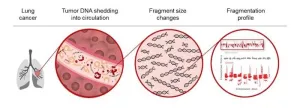(Press-News.org) The molecules that make up the matter around us are in constant motion. What if we could harness that energy and put it to use?
Over 150 years ago Maxwell theorized that if molecules’ motion could be measured accurately, this information could be used to power an engine. Until recently this was a thought experiment, but technological breakthroughs have made it possible to build working information engines in the lab.
With funding from the Foundational Questions Institute, SFU Physics professors John Bechhoefer and David Sivak teamed up to build an information engine and test its limits. Their work has greatly advanced our understanding of how these engines function, and a paper led by postdoctoral fellow Johan du Buisson and published recently in Advances in Physics: X summarizes the findings made during their collaboration.
“We live in a world full of extra unused energy that potentially could be used,” says Bechhoefer. Understanding how information engines function can not only help us put that energy to work, it can also suggest ways that existing engines could be redesigned to use energy more efficiently, and help us learn how biological motors work in organisms and the human body.
The team’s information engine consists of a tiny bead in a water bath that is held in place with an optical trap. When fluctuations in the water cause the bead to move in the desired direction, the trap can be adjusted to prevent the bead from returning to the place where it was before. By taking accurate measurements of the bead’s location and using that information to adjust the trap, the engine is able to convert the heat energy of the water into work.
To understand how fast and efficient the engine could be, the team tested multiple variables such as the mass of the bead and sampling frequency, and developed algorithms to reduce the uncertainty of their measurements.
“Stripped down to its simplest essence, we can systematically understand how things like temperature and the size of the system changes the things we can take advantage of,” Sivak says. “What are the strategies that work best? How do they change with all those different properties?”
The team was able to achieve the fastest speed recorded to date for an information engine, approximately ten times faster than the speed of E. coli, and comparable to the speed of motile bacteria found in marine environments.
Next, the team wanted to learn if an information engine could harvest more energy than it costs to run. “In equilibrium, that’s always a losing game,” Bechhoefer says. “The costs of gathering the information and processing it will always exceed what you’re getting out of it, but when you have an environment that has extra energy, [molecules doing] extra jiggling around, then that can change the balance if it’s strong enough.”
They found that in a non-equilibrium environment, where the engine was in a heat bath with a higher temperature than the measuring apparatus, it could output significantly more power than it cost to run.
All energy on Earth comes from the sun, and it eventually radiates out into space. That directional flow of energy manifests itself in many different ways, such as wind or ocean currents that can be harvested. Understanding the principles behind information engines can help us make better use of that energy.
“We’re coming at [energy harvesting] from a very different point of view, and we hope that this different perspective can lead to some different insights about how to be more efficient,” Bechhoefer says.
The pair is looking forward to working together on other projects in the future. “We were lucky to get a joint grant together. That really helped with the collaboration,” says Bechhoefer.
Sivak, a theorist, and Bechhoefer, an experimentalist, bring complementary approaches to their work, and they have been able to attract trainees who want to work with both. “We have different styles in terms of how we go about mentoring and leading a group,” says Sivak. “Our students and post-docs can benefit from both approaches.”
END
SFU Physics collaboration pushes an information engine to its limits
2024-06-06
ELSE PRESS RELEASES FROM THIS DATE:
Artificial intelligence blood test provides a reliable way to identify lung cancer
2024-06-06
Using artificial intelligence technology to identify patterns of DNA fragments associated with lung cancer, researchers from the Johns Hopkins Kimmel Cancer Center and other institutions have developed and validated a liquid biopsy that may help identify lung cancer earlier.
In a prospective study published June 3 in Cancer Discovery, the team demonstrated that artificial intelligence technology could identify people more likely to have lung cancer based on DNA fragment patterns in the blood. The study enrolled about 1,000 participants with and without cancer who met the criteria for traditional lung ...
The ethical matrix: it's not just smart; it's the smart thing to do
2024-06-06
Artificial Intelligence (AI) is the talk of the town, but far too often expediency has been the driver, not responsible innovation. The NYC Media Lab (NYCML) at NYU Tandon School of Engineering and Bertelsmann launched their 4th challenge this month, this time aimed at mentoring teams with projects that use AI to responsibly advance their fields.
The 2024 collaboration, The Ethical Matrix Challenge: Forging New AI Frontiers in Media, Communications, Education, and Healthcare, focuses on ethical AI and its power to have a real-world influence. The four selected teams have projects that can responsibly revolutionize the way ...
Study: Young athletes at risk for elevated blood pressure rates, future cardiovascular complications
2024-06-06
A substantial portion of young athletes are at risk of hypertension, according to a study presented at the American College of Cardiology’s Care of the Athletic Heart conference, taking place on June 6-8 in Washington.
High blood pressure, also known as hypertension, occurs in 47% of adults in the U.S., according to CardioSmart.org. Over time, hypertension weakens the heart, blood vessels and kidneys, paving the way for potential stroke or heart attack. Often referred to as the “silent killer,” high blood pressure is a leading risk factor for heart disease and early death.
The 2017 ACC/American Heart Association Guideline for the Prevention, ...
Mpox continues to circulate at low numbers among gay and bisexual men who have sex with men
2024-06-06
While mpox cases have sharply declined since the 2022 global outbreak, they continue to occur in the U.S. among gay and bisexual men who have sex with men (GBMSM), according to a UCLA-led study from EMERGEncy ID NET, a multisite surveillance network funded by the Centers for Disease Control and Prevention (CDC).
Though no cases were found in women, children or the unhoused, vigilance and vaccination remain important, the researchers write.
The findings will be published June 6 in the CDC’s Morbidity and Mortality Weekly Report.
Mpox, formerly known as monkeypox, ...
How the cell cycle orchestra plays an unexpected new tune
2024-06-06
How the Cell Cycle Orchestra Plays an Unexpected New Tune
UCSF scientists discover that multiciliated cells adapt the well-known process of cell division to make hundreds of cilia.
The awe-inspiring process of cell division can turn a fertilized egg into a baby – or a cancerous cell into a malignant tumor. With so much at stake, nature keeps it tightly controlled in a process called the cell cycle that scientists thought they thoroughly understood.
But now it turns out there was more to know. Scientists ...
Exotic black holes could be a byproduct of dark matter
2024-06-06
For every kilogram of matter that we can see — from the computer on your desk to distant stars and galaxies — there are 5 kilograms of invisible matter that suffuse our surroundings. This “dark matter” is a mysterious entity that evades all forms of direct observation yet makes its presence felt through its invisible pull on visible objects.
Fifty years ago, physicist Stephen Hawking offered one idea for what dark matter might be: a population of black holes, which might have formed very soon after the Big Bang. Such “primordial” black holes would not have been the goliaths that we detect today, but ...
El Centro Regional Medical Center provides financial and operational updates
2024-06-06
El Centro Regional Medical Center (ECRMC), an affiliate of UC San Diego Health, today announced several financial and operational updates, demonstrating significant progress toward stabilizing and strengthening a critical health services asset in the Imperial Valley.
“Our goal is simple — to ensure that the people of El Centro and the broader Imperial Valley have long-term access to health care services,” said Pablo Velez, RN, PhD, chief executive officer, ECRMC. “Over the last year, the amazing team of dedicated physicians and staff at ECRMC have worked tirelessly in partnership with UC San Diego ...
ESMO Gynaecological Cancers Congress 2024: Event Announcement
2024-06-06
Lugano, Switzerland, 6 June 2024 – The ESMO Gynaecological Cancers Congress 2024 will be held in Florence, Italy, between 20-22 June, hosting international experts who will present and discuss the latest developments in the biology, diagnosis and therapy of gynaecological tumours. The management of rare gynaecological malignancies will be among the key areas covered in the scientific programme, available online.
The congress can be joined either in person or via the online platform.
Programme ...
Dana-Farber Cancer Institute partners with Massachusetts firefighters to address cancer risks
2024-06-06
BOSTON – Dana-Farber Cancer Institute is proud to announce the launch of the Direct Connect Partnership with Massachusetts Firefighters, marking a crucial step in addressing the heightened cancer risk faced by firefighters.
Dana-Farber’s Direct Connect program partners with employers who want to support their workforce across the spectrum of oncology needs and provides guided access to world-renowned expertise from cancer care specialists. Direct Connect has more than ...
Tepper School study offers a better way to make AI fairer for everyone
2024-06-06
n a new paper, researchers from Carnegie Mellon University and Stevens Institute of Technology show a new way of thinking about the fair impacts of AI decisions. They draw on a well-established tradition known as social welfare optimization, which aims to make decisions fairer by focusing on the overall benefits and harms to individuals. This method can be used to evaluate the industry standard assessment tools for AI fairness, which look at approval rates across protected groups.
"In assessing fairness, the AI community tries to ensure equitable treatment for groups that differ in economic level, race, ethnic background, gender, and other categories,” ...

